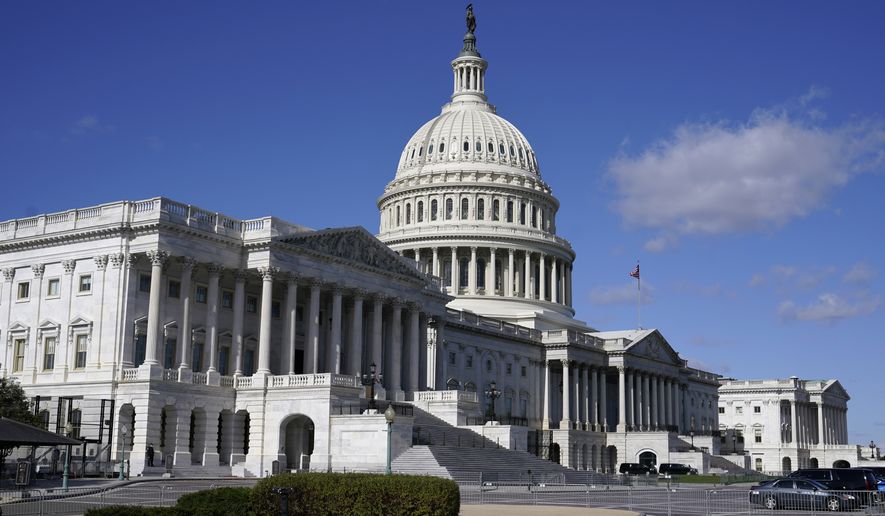A September slowdown in the economy and President Biden’s plummeting poll numbers are threatening to derail Democrats’ big-government spending plans.
Instead of anticipated economic gains, a resurgence of COVID-19 outbreaks, concerns about inflation and a persistent labor shortage have stalled employers’ plans to reopen workplaces and expand operations.
The uncertainty is reflected in several economic reports. Hirings in August totaled 235,000 jobs, down from about 1 million each in June and July.
Job openings hit a record 10.9 million in July, the Labor Department reported Wednesday, and employers offered higher wages and bonuses. Many economists say businesses will pass on their higher labor costs to consumers, adding to inflationary worries.
A record share of small-business owners, 50%, said they had vacant positions in August, the National Federation of Independent Business reported. That was the largest figure since 1986, the federation said, and a record 41% of small-business owners said they raised compensation.
“Owners are raising compensation in an attempt to attract workers, and these costs are being passed on to consumers through price hikes for goods and services, creating inflation pressures,” said Bill Dunkelberg, the federation’s chief economist.
Americans are worried about the COVID-19 delta variant and inflation. The University of Michigan’s measure of consumer sentiment fell in late August to its lowest level in a decade.
Against that backdrop, Mr. Biden is facing an increasingly divided Democratic Party in Congress as he seeks approval of two spending packages totaling roughly $4.7 trillion. Some moderate Democrats whose votes are needed to pass the measures on infrastructure and social programs have called for pausing consideration of the proposals or reducing the amount of spending that comprises the heart of Mr. Biden’s domestic agenda.
Mr. Biden’s job approval rating has fallen an average of 9 percentage points in the past three months. An ABC News/Washington Post survey found the president’s approval rating at 44% — lower than it was at the same point in President Obama’s first year in office, a year before Democrats lost 63 House seats in the 2010 midterm elections.
In a White House event Wednesday with Big Labor, the president took credit for rising wages while ignoring the inflation that has eroded income gains.
“The economy my administration is building — instead of workers competing with each other for the jobs that are scarce — everybody’s mad at me because now guess what? Employers are competing to attract workers,” Mr. Biden said. “Having that kind of competition in the market helps workers earn higher wages but also gives them the power to demand dignity and respect in the workplace.”
The president noted that employers have added about 4 million jobs since he took office.
“In the first half of this year, our economy grew fast at the fastest rate in 40 years,” he said. “Unemployment is down. My ‘Build Back Better’ investments are going to allow us to keep the progress and move further in the years to come.”
Republicans say Mr. Biden has yet to show competence in any area of his administration.
“Joe Biden can’t even answer a question without a script,” Sen. Tom Cotton, Arkansas Republican, tweeted Wednesday. “But he thinks he has the capacity to completely reshape the American economy. Like everything else he does, Biden’s reckless economic plan would be a disaster.”
In the ABC News poll, 45% of Americans approved of Mr. Biden’s handling of the economy, down 7 points from April.
The president’s handling of the pandemic dropped 10 points from June, to 52%, as the number of children with COVID-19 rises. Mr. Biden is scheduled to deliver another speech about the pandemic on Thursday, this time to outline a six-point plan on vaccine mandates and testing.
“The president is in the next few days going to talk a little more about how we’re going to take the next steps, how we move forward,” Labor Secretary Marty Walsh said on CNN. “The biggest issue here is that we have to defeat the delta variant.”
The Labor Department’s Job Openings and Labor Turnover Survey found the number of job vacancies exceeded hires by 4.3 million in July, the most in at least 20 years. The number of people who left their jobs voluntarily rose to 4 million in July, and the “quits” rate remained at a near record of 2.7%.
Referring to the record number of job openings, Mr. Walsh said the U.S. labor market is undergoing a fundamental change because of the pandemic.
“Everything will adjust itself,” he said. “I don’t have a quick answer. … I think that’s going to take a lot more working with economists and working with companies and working with employees. We’ve never lived through times like this. We’ve never had to recover from a pandemic like this. It’s going to be up and down for a little bit.”
The White House National Economic Council blamed meatpacking “conglomerates” Wednesday for rising grocery prices. It said four companies control more than half the market for beef, pork and poultry.
“If you take out those three categories, we’ve actually seen price increases that are more in line with historical norms,” said Brian Deese, director of the council. He raised concerns about “pandemic profiteering” in the meatpacking industry and noted that the administration is investigating suspected price-fixing.
But as recently as July 1, the White House cited data from the Farm Bureau to boast that the cost of the traditional family Fourth of July cookout was 16 cents lower than last year, thanks to the president’s policies.
The White House tweeted at the time, “Planning a cookout this year? Ketchup on the news. According to the Farm Bureau, the cost of a 4th of July BBQ is down from last year. It’s a fact you must-hear(d). Hot dog, the Biden economic plan is working. And that’s something we can all relish.”
• Dave Boyer can be reached at dboyer@washingtontimes.com.




Please read our comment policy before commenting.